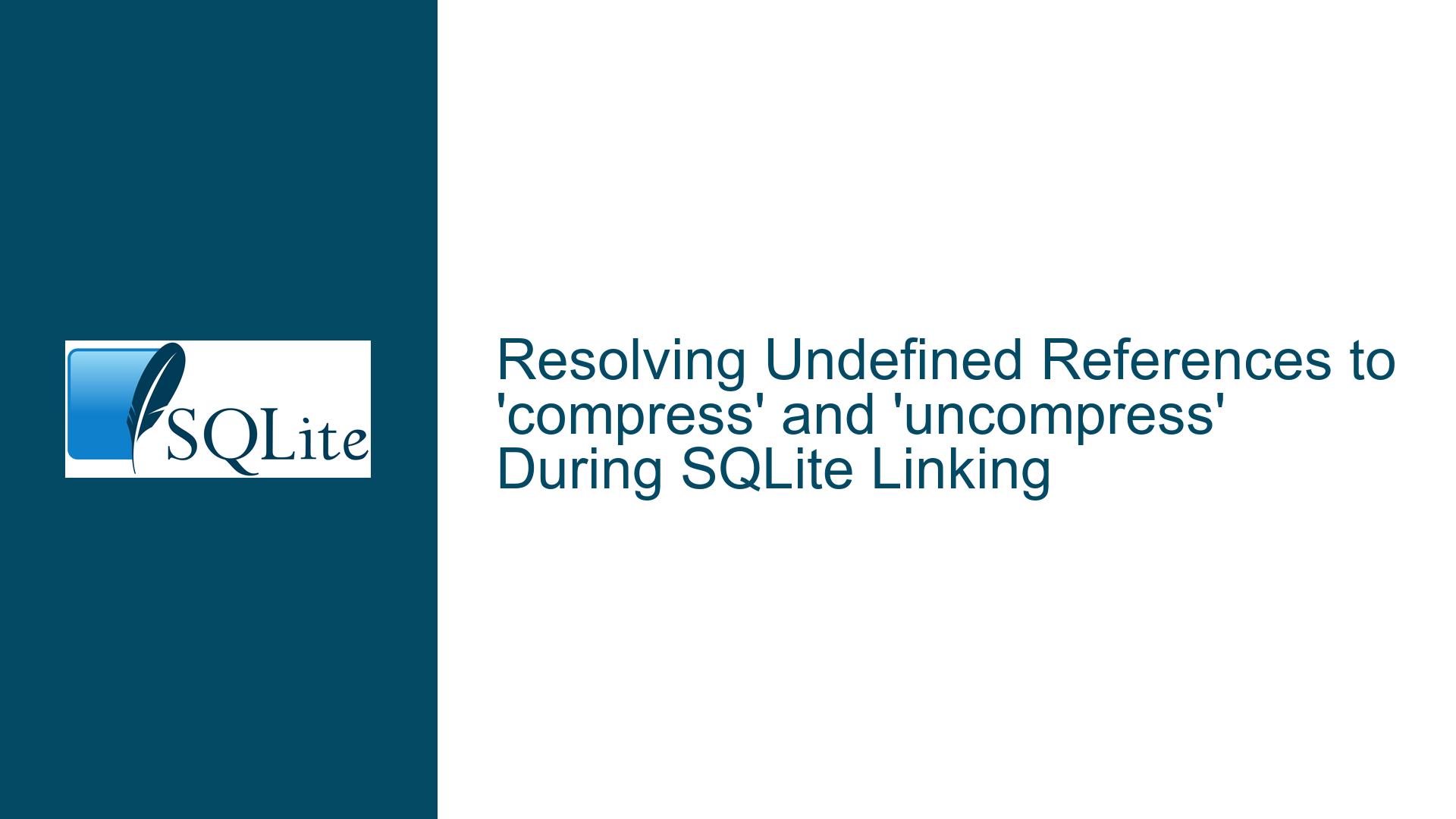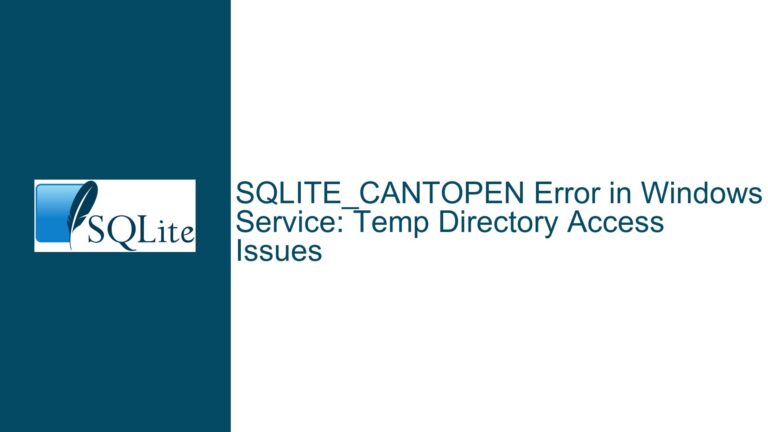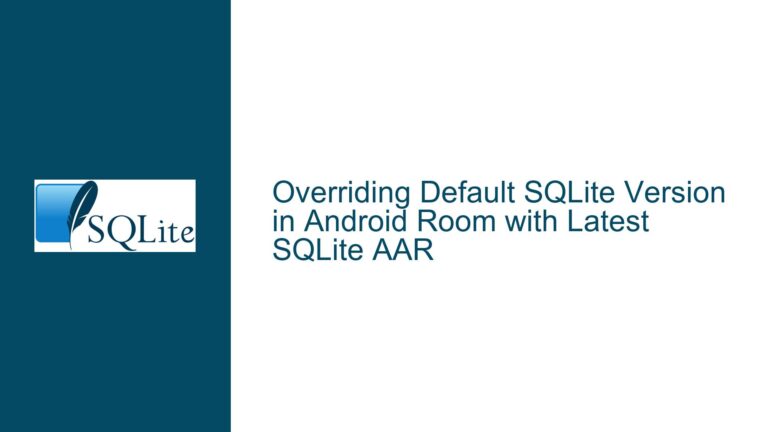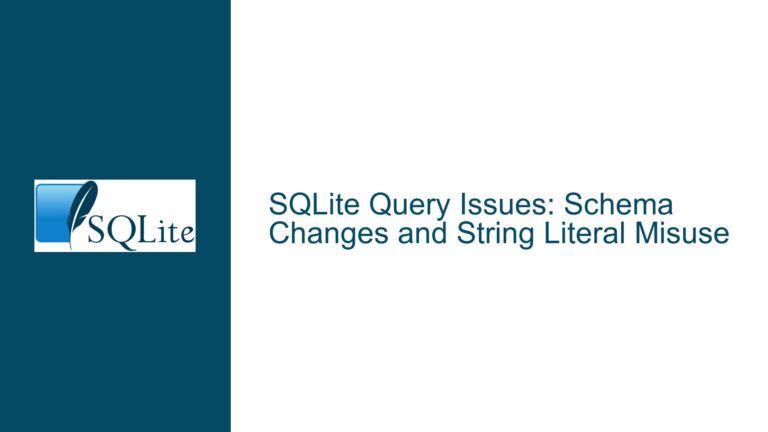Resolving Undefined References to ‘compress’ and ‘uncompress’ During SQLite Linking
Issue Overview: Undefined Symbol Errors During Final Linking Phase
The core problem revolves around a failed compilation process where the linker (ld) reports undefined references to the functions compress and uncompress during the final stage of building an executable that links against SQLite. These functions are part of the zlib compression library, a dependency required when using SQLite’s compress.c extension or other features relying on compression. The error manifests explicitly when the compiler (here, g++) attempts to create the final executable by linking object files.
The error messages indicate that the linker cannot find implementations for compress and uncompress, even though their declarations are present in the code. This typically occurs when the build process either omits linking against the zlib library (-lz) or misplaces linker flags during compilation phases. The functions compress and uncompress are standard zlib APIs, and their absence during linking suggests a misconfiguration in how the build script informs the linker about their location.
This issue is particularly common in projects that combine C and C++ code, where compiler/linker flag placement and order matter. SQLite extensions like compress.c depend on zlib, but SQLite itself does not bundle zlib. Thus, developers must ensure the build process explicitly links against zlib. The problem is exacerbated when transitioning from a pure C project to a mixed C/C++ environment, as C++ compilers handle name mangling and library linking differently.
Possible Causes: Library Linking Order and Compilation Phase Misconfiguration
Incorrect Placement of Linker Flags in Compilation Phase
The most immediate cause is the placement of linker-specific flags (-ldl, -lpthread, -lm, -lz) during the object file compilation phase instead of the executable linking phase. In the provided script, gcc is invoked with -c to compile sqlite3.c into sqlite.o, and the -lz flag is included at this stage. However, -l flags are linker directives that have no effect during compilation (-c), as they instruct the linker—not the compiler—to resolve symbols against specific libraries. The -lz flag must instead be passed to the linker during the final executable creation phase (g++ sqlite.o ... -o sqlch).
Missing or Improperly Installed zlib Library
Even with correct linker flag placement, the absence of the zlib development package on the system will cause the same error. The linker requires both the header files (for declarations) and the shared/static library binaries (for implementations). On Linux systems, libz-dev or zlib-devel packages provide these. If zlib is installed in a non-standard location, the linker must be informed via -L/path/to/zlib flags.
Implicit Function Declarations and C/C++ Symbol Mangling
The compress.c extension includes zlib headers (#include <zlib.h>), which declare compress and uncompress. However, if the headers are missing or not properly included during compilation, the compiler may assume implicit function declarations (int compress();), leading to mismatched symbol expectations between the object file and the linker. Additionally, when mixing C and C++ code, C++ compilers perform name mangling to encode function signatures into symbols. If the zlib functions are not declared with extern "C" in a C++ context, the linker will seek mangled names that do not exist in the C-compiled zlib library.
Static vs. Dynamic Linking Conflicts
If SQLite is compiled with static linking assumptions but zlib is available only as a dynamic library (or vice versa), the linker may fail to resolve the symbols. This is less common in default setups but can occur in cross-compilation environments or custom build configurations.
Troubleshooting Steps, Solutions & Fixes: Correcting Linker Flags and Dependency Configuration
Step 1: Validate Linker Flag Placement in Build Script
The primary fix involves moving all -l flags from the object compilation phase to the executable linking phase. In the original script:
gcc -g -c ... -ldl -lpthread -lm -lz -o sqlite.o
The -l flags are ignored because -c tells gcc to compile but not link. The corrected script should omit -l flags during compilation and include them during linking:
gcc -g -c -I. -I ~/sqlite -I ~/sqlite/ext/misc -I ~/sqlite/src -DSQLITE_EXTRA_INIT=extra_init ~/sqlite/sqlite3.c -o sqlite.o
g++ -g sqlite.o sqlch.cpp -ldl -lpthread -lm -lz -o sqlch
This ensures the linker resolves compress and uncompress against libz.so (or libz.a).
Step 2: Verify zlib Installation and Headers
Ensure zlib development files are installed. On Debian/Ubuntu:
sudo apt-get install zlib1g-dev
On Red Hat/CentOS:
sudo yum install zlib-devel
For macOS with Homebrew:
brew install zlib
Confirm the presence of zlib.h in standard include paths (/usr/include, /usr/local/include) or adjust the compiler’s include path with -I/path/to/zlib/include.
Step 3: Address C/C++ Symbol Mangling with extern "C"
If the SQLite extension code is included in a C++ project, wrap the zlib header inclusion with extern "C" to prevent name mangling:
extern "C" {
#include <zlib.h>
}
This ensures the linker looks for the unmangled symbols compress and uncompress.
Step 4: Specify Library Search Paths Explicitly
If zlib is installed in a non-standard location (e.g., /opt/zlib), append the library search path to the linker flags:
g++ -g sqlite.o sqlch.cpp -L/opt/zlib/lib -ldl -lpthread -lm -lz -o sqlch
Step 5: Validate Function Signatures and Header Inclusion
Inspect compress.c to ensure it includes zlib.h and that the function signatures match. The zlib functions are defined as:
int compress(Bytef *dest, uLongf *destLen, const Bytef *source, uLong sourceLen);
int uncompress(Bytef *dest, uLongf *destLen, const Bytef *source, uLong sourceLen);
Any discrepancy between these declarations and their use in compress.c will cause linker errors.
Step 6: Test with a Minimal Example
Isolate the issue by creating a minimal C++ program that calls compress:
// test_zlib.cpp
#include <zlib.h>
int main() {
Bytef dest[100];
uLongf destLen = 100;
const Bytef source[] = "test";
uLong sourceLen = 5;
compress(dest, &destLen, source, sourceLen);
return 0;
}
Compile with:
g++ test_zlib.cpp -lz -o test_zlib
If this fails, the zlib installation is faulty. If it succeeds, the issue lies in the project’s build configuration.
Step 7: Examine Linker Command Order
The order of libraries in the linker command matters. Libraries depending on other libraries should appear first. Place -lz after any libraries that depend on it. In most cases, -lz can be placed at the end.
Step 8: Rebuild SQLite with ZLIB Integration
If using a custom SQLite build, ensure zlib support is enabled during SQLite compilation. This is rarely necessary for the compress.c extension but may apply to other features:
export CPPFLAGS="-I/opt/zlib/include"
export LDFLAGS="-L/opt/zlib/lib"
./configure --with-zlib
make
Step 9: Diagnose with Linker Verbose Output
Use the -Wl,--verbose flag to inspect the linker’s search process:
g++ -g sqlite.o sqlch.cpp -Wl,--verbose -ldl -lpthread -lm -lz -o sqlch
This outputs detailed information about library search paths and resolved symbols.
Step 10: Cross-Validate with Pure C Linking
Temporarily replace g++ with gcc in the linking phase to rule out C++-specific issues:
gcc -g sqlite.o sqlch.cpp -ldl -lpthread -lm -lz -o sqlch
If this works, the issue stems from C++ name mangling or runtime library differences.
By systematically addressing linker flag placement, zlib installation integrity, and symbol visibility, the undefined reference errors can be resolved, enabling successful compilation of SQLite-based projects with compression support.






